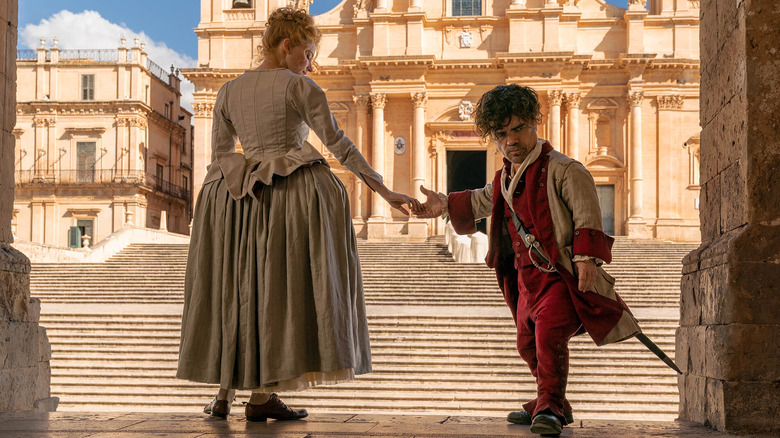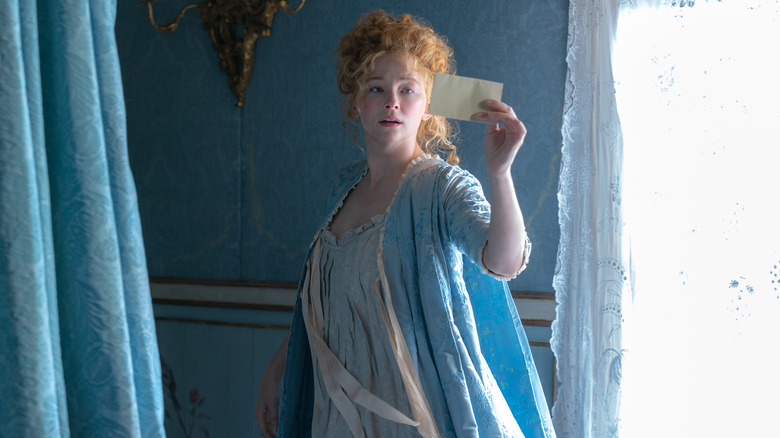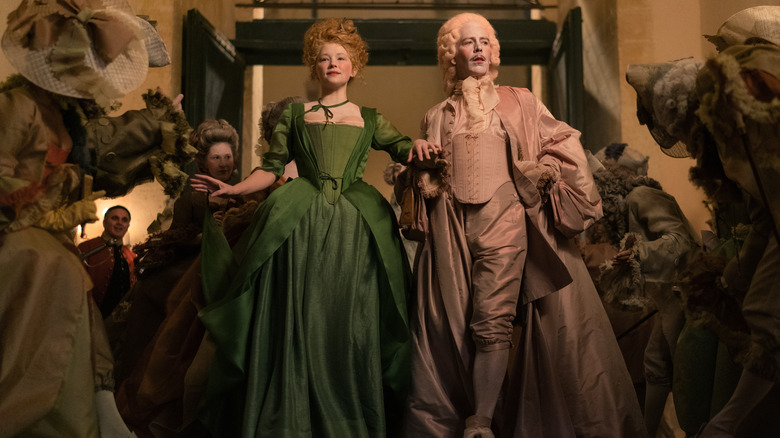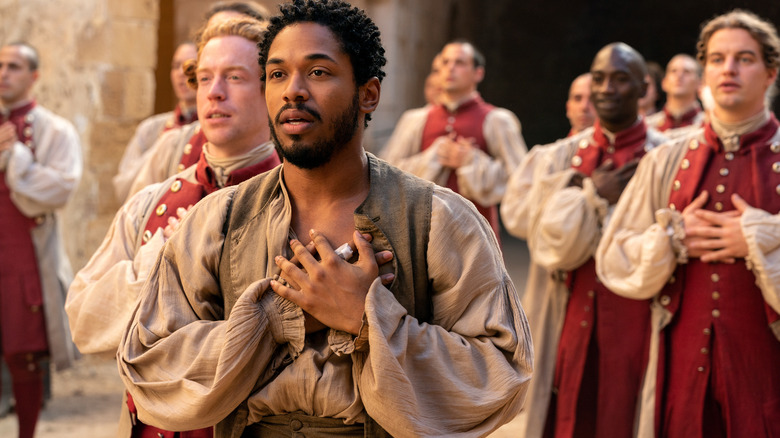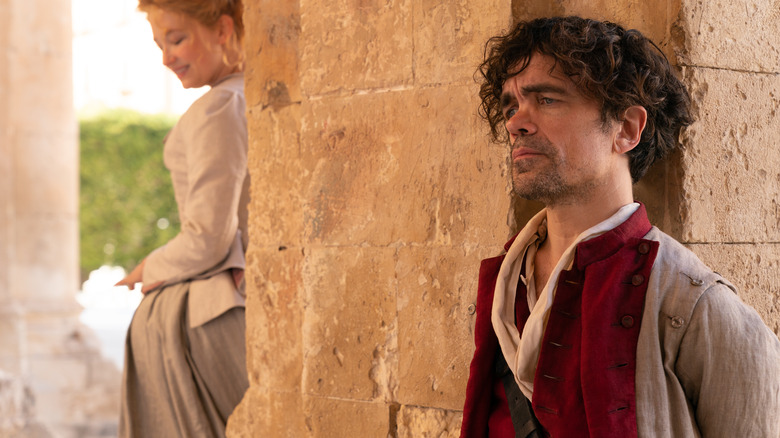Cyrano Screenwriter Erica Schmidt On Collaborating With The National To Put A Musical Spin On A Classic [Interview]
Although the pandemic had the potential to derail "Cyrano," as it did so many other Hollywood productions, it surprisingly served as a catalyst to get production underway. The adaptation of Edmond Rostand's 1897 play had been in the works for years, based on Erica Schmidt's updated musical, which caught the attention of "Pride and Prejudice" director Joe Wright. In the long run, the film would become a stunning collaboration between creative minds, with Wright's sensibilities working in tandem with music by The National, but the vision first began with Schmidt, a wordsmith and playwright.
With her musical, Schmidt envisioned a version of Cyrano's story that dispensed of his iconic long nose to tell a more universal story of self-doubt. In this version, the clever and confident Cyrano is unable to confess his love to Roxanne for no reason other than his lack of confidence in himself. This change drew Schmidt's husband, "Game of Thrones" alum Peter Dinklage, to the role and the magic he produced onstage alongside Haley Bennett sparked Joe Wright's imagination for an adaptation. Initially, plans moved along slowly: The songwriters — members of the rock bank, The National — were off on tour, the actors busy in other roles, Wright was directing another project, and Schmidt was writing for theater. But when the pandemic hit and work became scarce, the team decided they were in the perfect moment for a film about connection — so they got to work.
/Film recently caught up with screenwriter Erica Schmidt to talk through the process of bringing "Cyrano" from stage to screen. For her, the film was the perfect balancing act of creative minds, from the lead performers to Joe Wright to The National to Rostand's original work to Schmidt herself. In the end, the team created a take on this story unlike any that came before.
'I'd never written a screenplay before, so I was nervous, but it was exciting to imagine'
This interview has been lightly edited for clarity.
So the story I've heard is that Joe Wright attended a performance of your stage version of "Cyrano" and called to talk about turning it into a film. What was your initial reaction?
Yes, it's true he called, and he had seen the play and he wanted to make it into a film. I'd never considered. I would never have had that idea if he hadn't called and asked. It never would've been something I would've done, so I was surprised. And I'd never written a screenplay before, so I was sort of nervous, but it was exciting to imagine. I really liked "Atonement," and I liked "Pride and Prejudice" so much, so I thought he had the right sensibility for the material — for the way that The National and I had tried to frame the Rostand play, the kind of yearning and longing and romance of it. So I guess I would say I was surprised and I was excited. And I was kind of nervous, because I didn't know what the process would be, or how I would begin.
How long were you working on the screenplay?
Well, he saw the play in 2018, and then he was very busy. And The National was touring and I was doing theater jobs. So I worked on the screenplay over the course of a year, but it was never like I was just working on it. Then we met in the winter and we spent like a whole day locked in a room together and he gave me his notes. About four months after that, he called me in June and the pandemic [had started] in March. And he said, "You know, I really would like the second draft. I think I can make it happen in the pandemic. Could you do that?"
I just thought, okay. I mean, there was no theater, I wasn't doing anything else. So I sat down and really, really focused on it, and I sent it to him about 10 days later. I had said in the email, "I can't wait for your notes. This is just for you, please don't share it with anyone." And he called me and said, "I think it's ready. I would like to share it with the producers," and I was so surprised. And then it sold to MGM within a week. Then three months later we were in Sicily shooting. So I think that was really because of Joe and MGM gambling on making a movie in that moment. And because the band wasn't touring, and Peter and Haley weren't working. I mean, no one was working. It was just three months into the pandemic. So I think that's why it came together so quickly.
What were the subtle differences of writing for screen versus for stage?
Well, there were a lot of differences. When I did it on stage, I pared it down to just 10 actors and I really focused on the triangle of Christian, Cyrano, and Roxanne. I tried to make it really spare and intimate, almost like a close-up. And because it was through-composed, the entire play was underscored with Aaron and Bryce's music. It sort of felt cinematic in a way, and it was modern dress, basically. It was created period, but more modern than period. And Joe really wanted it to go back to the Rostand first act, really big with all of society and this big set piece in the theater. He wanted it to be Baroque period, not really specific, but basically 1600s.
That was a huge change, and then he wanted it to kind of move through the five acts to land basically where it was in the stage version. So the last act is pretty much as it was on stage, [but] the first act is completely different. So it was really a process of working with Joe and listening to what he had wanted and trying to evaluate what it was that he'd liked about what he had seen. Then also the original source material, balancing all of those different things.
'Our piece is unique because it was never, ever intended to be a traditional musical'
Were there any big roadblocks for you in that adaptation process and in making some of those big changes?
Not roadblocks so much as ... you know, I'd never written a screenplay before. So it was a real learning curve in terms of how to express things visually, and Joe really wanted to keep all of the dialogue. I was sort of excited to cut it all, and just tell the story in image, but he really liked how wordy it was. So I was trying to find a balance between the way the songs function, which could now embrace narrative visual storytelling at the same time that the songs are allowing you to kind of go into the soul of the character, and then also keep all of that really chunky dialogue. I would say it was really a balancing act. Matt's lyrics have a certain voice and tone that has to be blended with Joe's very British aesthetic, with the Rostand, with my initial impulses, with what the actors are doing and bringing into it. So it's really that kind of challenge.
That balancing act is really interesting, especially because "Cyrano" is coming during a really musical-heavy year. Coming from theater, what do you think are the challenges of bringing a musical from stage to screen, or even just having an onscreen musical right now?
I think that our piece is unique because it was never, ever intended to be a traditional musical. It's just not the way that Aaron and Bryce and Matt and Carin write at all. So we were always thinking of it as a through-composed play that has songs. And the songs on stage aren't like they are in "West Side Story" or "Cats" or "Hamilton." You can't dance to them and they aren't propelling the action forward. They're not giving you the information you need to get to the next moment in the play. Instead, they are like a full stop, this is what my soul is feeling, or I need to express to you that this is what I'm feeling for you, but it's going to take longer than it would if I was saying it.
On stage, I think it was different than what people expected. It was harder to sit with because people have expectations when they hear "Cyrano," and they hear a musical. But in this film version, all of those things can happen. You can have the whole bakery scene. The scene with Cyrano can happen at the same time that he's writing a letter to Roxanne and singing. And the flower ballet happens and everything's intercut, and it feels like you're getting so much information while you're also just privately with him while he's thinking. So in a way, it's really, really different than something that is beloved like "West Side Story." Or I mean, I love the stage play of "Tick, Tick...Boom." It's a very different kind of process.
Even "Tick, Tick...Boom," the movie version ends up a very experimental riff on what the original was. There is, it sounds like, more room for musicals to be experimental in that way now.
I definitely think there's similar freedom that maybe you don't have when you're doing "Les Mis" or "Sweeney Todd," these really successful properties that function kind of in one way, whether it's on stage or on screen. I think maybe the great benefit is it brings it to more people, because theater tickets are so expensive and they're such a finite place.
'Everything came together at that moment'
It sounds like Cyrano was really a collaborative process. At what point in the process did you know that you wanted The National doing the music, or that you wanted Peter in the starring role?
I was originally commissioned in 2004 to work on a musical adaptation of "Cyrano," but I didn't know who would do the music. Then the guy, Michael Genero, who had commissioned me like 10 years later was at a different theater, and he said, "Let's pull it out of the desk drawer." At that point, I knew I wanted The National so badly. So I just pursued them and really for years tried to get them to do it, and eventually was able to convince them.
Matt Berninger, who is the lead singer of The National and writes the lyrics, he kind of came on board with me first, and he shared with me like four hours of music. Aaron and Bryce write what they call sketches, which are like very brief ideas for songs. They send them to Matt and then he either imagines lyric over it, or he doesn't. If he does, they become National songs, over a long kind of development. So he had all these sketches that had not become National songs, and he shared them with me. I put them into my book and I listened to them over and over as I rewrote the book. And so the book became much, much more spare because of their music. Their music became the heartbeat of the piece.
They still weren't like a hundred percent on board with the project. So I invited Bryce over to our house, and I was going to press play on his music while he listens to actors read it. Because he was coming over, and Pete loves The National as well, he said, I'll read [the character of] Cyrano. And I just thought, "Okay, sure." So he read it and the minute he read it, it was really clear that it was his role. And then because it was this kind of crazy moment in the room, Bryce was like, "We should absolutely do this." So everything came together at that moment. Then from there, it was extremely collaborative working with Bryce and Aaron and Matt. I mean, it was one of the biggest joys of my life, getting to learn from them, work with them, and share ideas.
'I feel strongly that Roxanne cannot know that Cyrano wrote the letters'
What does that process look like, weaving your words into their music and lyrics?
Well, initially it was that I just chose the tracks and I put them with the scenes. When we were going to write songs that we agreed were going to be songs for the play, I sent Matt, like, "This is the track name, I want this to be the balcony scene." So then he would take the texts — I had adapted or edited Rostand's balcony scene into my own version of it. Then I had the track from Aaron and Bryce, and I sent that to Matt, and he came back with the song "Overcome," and then he has a process with Carin where they go back and forth with lyrics.
With "Wherever I Fall," which is the war song that the cadets sing ... There's a song in the original Rostand where the cadets sing about Gascony, about home. So Matt and I looked at all of the war songs, like all the songs soldiers sing over time, like all through history. And we found a similarity in [the] form where [it's] like improv and then a chorus that everyone knows. So with that, he went away and wrote that song for those three cadets. It remains one of my favorite songs in the piece. With "Madly," which is the have you over loved someone madly, that line, that one was the first song that we worked on. We went back and forth, over and over with just ideas for lyrics for what was the nature of their relationship. There's like a hundred drafts of that which have never been used. There's a line that's cut, that Roxanne wears wigs. I think she wears huge pink and white wigs. Matt wrote it into a lyric, and it was so fun to do that. And of course, that's gone now.
When I spoke with Haley, she was telling me about this idea that Roxanne is aware of Cyrano's affections, but ultimately chooses the person who can say aloud to her that they're in love with her. I was curious if that's something that you had in mind, or if that's something that came to be as she came to the character.
I believe that's a Joe idea. To me, I feel strongly that Roxanne cannot know that Cyrano wrote the letters. She can walk right up to the edge of that. Like, she can have a kind of understanding as you do, if you have a very, very close friend that you know, that they look at you a little longer than maybe they should. Or there's an awareness of him in her life. But I think, myself, that she can never ever know that he wrote the letters. Because if she knows and she marries Christian, I think that makes her a terrible person. Because then she's using Christian for something or she chooses not to marry Cyrano ... why? When he's everything that she wants. So that's where I stand on the great debate.
I also feel strongly that Roxanne can be a brilliant woman and a brilliant poet, and also live in this beautiful dream. She wants so badly to have Christian be everything that she allows herself to believe that [he is]. To me, that's very human. Like how we choose to not see that our partner is an alcoholic or having an affair, or any one of the things that happens all the time to everyone. I think she has both of those things going on at the same time. If she knew, if she really knew, then to me, it becomes like she's not a nice person. Although I understand as an actor, why Haley would want to dance with that [idea].
"Cyrano" opens in theaters on February 25, 2022.
